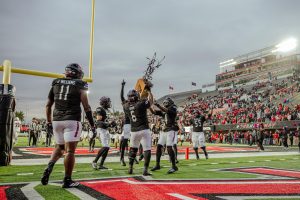Men discuss trials of homosexual lifestyle
November 14, 1990
Editor’s note: This is the final part of a three-part series on homosexual students at NIU. In this installment two gay men discuss how AIDS has affected their relationship.
In most Midwestern junior and senior high schools, being labeled a “fag” or “queer” is akin to being deemed a witch in colonial America. Both are met with similar understanding and enthusiasm.
Some gays who survived high school came to NIU in search of freedom unknown during adolescence. Now the AIDS crisis has cast a shadow on that freedom. A handful of gay NIU students tell how the crisis affected their lives.
Brad*
“I’ve known two people who have died from AIDS, but I didn’t know them particularly well. They were 10 or 15 years older than I was.
My lover has been affected a little more strongly because he knew a lot of these people and they were his friends. He’s 13 years older than I am. I feel more sorrow on his behalf.
Now that AIDS has reached the heterosexual population, it is considered a big danger. There’s a commercial that Ronald Reagan does now and he basically says, ‘Babies can get infected too, so now it’s important to do something about AIDS.’ I feel a little bit of spite.
The crisis has definitely had an effect on the gay community in DeKalb. Insofar as the AIDS crisis goes, they have changed their behavior.
According to a recent survey, at least 60 percent of gay men say they use protection when they have sex and I think the figure could go all the way to 90 percent and above.
After the first six months of our relationship, we both got tested and did it again six months later. Since then, we haven’t worried about it. We have a lot of trust between us, so we don’t worry about it.
Steve*
There’s really two ways that gay men can interact. There’s the sterotypical bed-hopping and the more accepted dating; you go out together and date a few times—the typical romantic sort of thing.
I think gay men have a harder time having relationships than women do because women are brought up to be the caretakers of the relationship. So in a lesbian relationship you have two caretakers who are taking care of and worrying over their relationship.
When you have two guys together, they think the other is taking care of their relationship. That’s the way guys are brought up. Guys are taught, ‘get what you can, when you can.’ Girls are told to hold back and control the situation.
I think there are still a lot of older gays who feel that AIDS will never happen to them. That’s what a lot of people think. On the other hand, because the gay community has been so affected by it, there are some people saying, ‘Hey, it’s a real thing. It could happen to anyone—your best friend, neighbor or your lover,’ and they are taking it very seriously.
It’s always there. Whenever I’m with somebody, I always have to consider the fact that if I sleep with him I may be exposing myself and could be dead in five years.
The crisis has taken some of the freedom that was felt by gays in the past; the freedom to let things happen and go with the flow. Now sex almost has become impersonal. It’s like, ‘OK, give me your medical information. When was the last time you were tested?’
It’s a similar situation with condom usage. I think a lot of people out there find it very annoying. It takes a lot of the romance out of it, but you have to do it.”
Rich*
“I don’t know anyone with AIDS. I never have, mostly because I only started meeting other gays a year ago. I guess it affects me in that I really have to be careful. I think I’m knowledgeable enough to realize what harm it could do to me.
Men seem to have a harder time committing to one person than women do. My mother had this saying that all men are dogs. In some respects that’s true.
Gay or straight, most men have a very immature attitude about relationships. Men tend to go for one thing—sex. I guess because of that mentality, men aren’t very good at intimate relationships. If their partner doesn’t give them sex, they try to find someone else who will.
It’s a shame they’re not able to express themselves, that they can’t be more open and at the same time not have to worry about their ‘masculinity.'”
Not their real names






